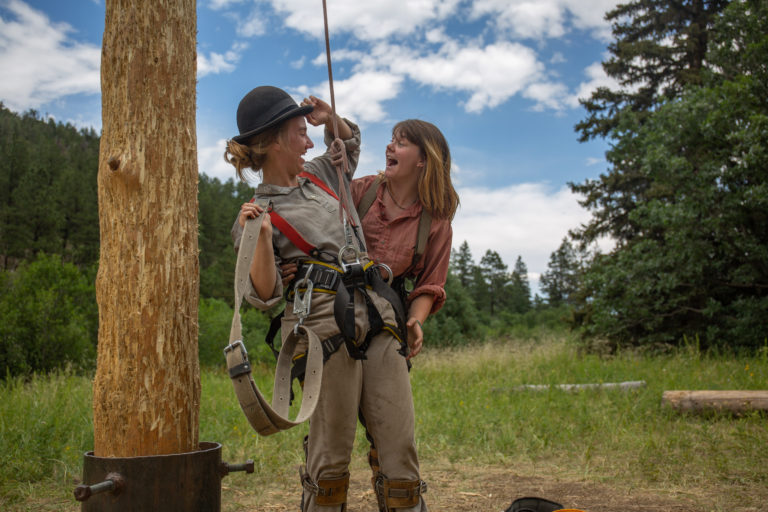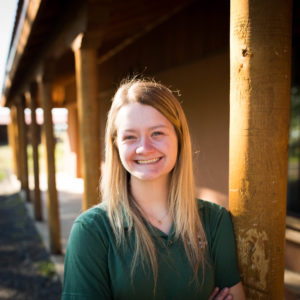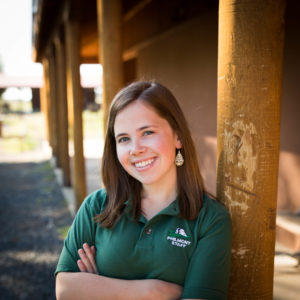Editor’s Note: As part of Philmont’s busiest season ever, a record number of participants and seasonal staff are visiting the ranch and reaching new milestones. Three staff camps have female Program Counselors for the first time ever this year: Metcalf Station, Crater Lake and Pueblano. As part of our series Women of Philmont, we will be interviewing groundbreaking female staff members as they return HOmE for the summer.
When she was growing up, Maggie McCulloch dreamt of becoming one of the ‘Pueblano Boys.’
Her father worked full-time for Philmont Scout Ranch, and she frequently watched campfire shows in the Backcountry. Her favorite evening program was at Pueblano where rowdy lumberjacks told stories and sang.
As McCulloch got older, she went on a trek and noticed that there were only lumberjacks at Pueblano; never lumberjills.
“I felt kind of sad because I never thought I would get the chance to work at Pueblano because it just wasn’t a place where girls were at,” McCulloch said.
McCulloch never gave up on her goal to work in the Backcountry. When Philmont started to allow women at Pueblano in 2018, she and fellow staffer Becca Goughnour applied. Now they are the first female Program Counselors at Pueblano.
The camp used to be all-male, and it serves as a logging camp where participants can spar pole climb, use crosscut saws and cut wood with an ax.
Staff members portray life at the Continental Tie and Lumber Company in 1918, a real-life company in New Mexico at the time. The Continental Tie and Lumber Company train ran through Pueblano and the surrounding timber towns.

Above: Maggie McCulloch catches Becca Goughnour after repelling down a spar pole she climbed at Pueblano. Photographed by Monica Dunn.
Backcountry staff members are hired by David O’Neill, Philmont’s Senior Associate Director of Camping and Team Lead Backcountry. O’Neill, along with female staff, pushed for women to be hired at male-only camps like Pueblano. He worked with staff so they could start portraying points in history where more women were working in male-dominated jobs.
“Certainly the history has always been there… for logging camps and even railroading history tells the stories of women doing the jobs that men did,” he said. “And a lot of it had to do with wartime efforts.”
Pueblano is now set in 1918, the year World War I ended. Historically, lots of men went to fight in the war, and the workforce needed more laborers. Women stepped up to fill these positions, including open jobs at the Continental Tie and Lumber Company.
Now, female staff at Pueblano help portray the lives of working women during World War I.
“We were never part of the Philmont story before, but now we get to be,” McCulloch said. “They have a story to tell, so we’re here to tell it for them.”
Although there are some camps who have not had female staff members or female Camp Directors, O’Neill said all Philmont positions are open to women and they are welcome to apply.
Welcoming female staff with open arms has had a lasting effect on Pueblano staff and female participants.
“It’s really powerful to see other women working here,” Goughnour said. “Just having that solidarity of you can go places in life, and you can do literally the same thing that men can do, which is really, really cool and important.”

Zoe Hambley
Zoe is a first-year Philmont staffer out of North Carolina. She studies journalism and is interested in graphic design and videography.

Monica Dunn
Monica Dunn is a first-year Philmont staffer out of Savannah, Missouri. She’s studying convergence journalism with an emphasis in emerging media at the University of Missouri School of Journalism. Monica loves sharing people’s stories and is excited to share Philmont’s.